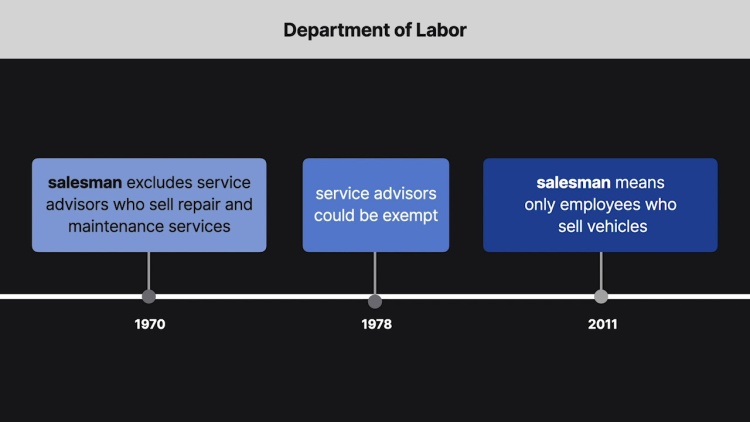Encino Motorcars, LLC v. Navarro
United States Supreme Court
136 S. Ct. 2117 (2016)

- Written by Sean Carroll, JD
Facts
The Fair Labor Standards Act (FLSA) required employers to pay time-and-a-half wages for any hours worked in excess of 40 hours in a given week. The FLSA provided an exemption for certain workers who sold or serviced vehicles. The Department of Labor had long interpreted the law to qualify service advisors under the exemption. The industry came to rely on this interpretation. However, in 2011, the department promulgated a regulation stating that service advisors did not qualify for the exemption. In adopting the regulation, the department gave only a summary discussion of the change. The department provided no detailed reasons for the change but mainly conclusory statements. Hector Navarro (plaintiff) worked for Encino Motorcars, LLC (Encino) (defendant) as a service advisor. Navarro worked over 40 hours per week. Encino paid Navarro via commissions on his services, rather than by salary or hourly wage. Navarro sued Encino in the United States District Court for the Central District of California for violating the FLSA’s overtime provision. The district court granted Encino’s motion to dismiss on the ground that Navarro was covered under the FLSA’s exemption for automobile service advisors. The United States Court of Appeals for the Ninth Circuit reversed, granting Chevron deference to the department’s 2011 regulation. The United States Supreme Court granted certiorari.
Rule of Law
Issue
Holding and Reasoning (Kennedy, J.)
What to do next…
Here's why 905,000 law students have relied on our case briefs:
- Written by law professors and practitioners, not other law students. 47,100 briefs, keyed to 995 casebooks. Top-notch customer support.
- The right amount of information, includes the facts, issues, rule of law, holding and reasoning, and any concurrences and dissents.
- Access in your classes, works on your mobile and tablet. Massive library of related video lessons and high quality multiple-choice questions.
- Easy to use, uniform format for every case brief. Written in plain English, not in legalese. Our briefs summarize and simplify; they don’t just repeat the court’s language.





